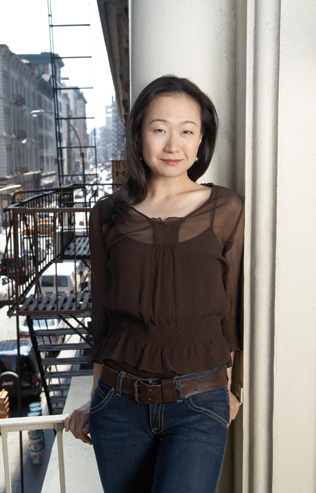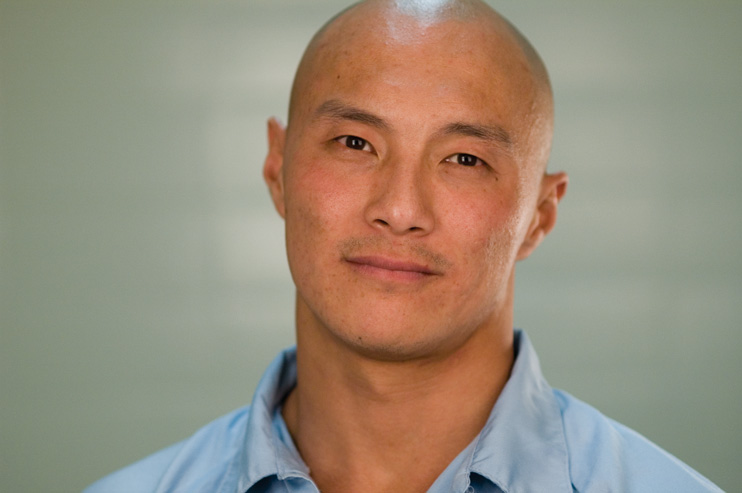Echelons and Emotions
by KAI MA
photo by RICHARD CORMAN
Media buzz for Min Jin Lee’s debut novel, Free Food for Millionaires, was at its height when we met at her publisher’s Manhattan office in May. As she sunk into a plush couch, she read her latest review by Entertainment Weekly’s Tina Jordan, who described the book as a “big, juicy, commercial Korean-American coming-of-age novel [that] could spawn a satisfying miniseries.” Jordan then rated the tome using the magazine’s signature grading system. “I’m such a model minority,” Lee said with a mock grimace after seeing her mark. “Of course, I’m wondering why I got a B. Why not an A?”
It’s a question Casey Han, the 22-year-old main character in Free Food, might’ve mulled over during college in Lee’s tale about class and identity. Casey is the “unusually tall” first daughter of an immigrant couple from South Korea, who like the 38-year-old Lee, penetrates the Ivy League and Manhattan professional world.
It is the fluidity and rigidity of the U.S. class system that Lee exposes through a series of storylines that echo her own life. Both Lee and her fictional counterpart grew up in Elmhurst, a neighborhood in New York City. Casey’s parents toil in a dry-cleaning franchise in Queens; Lee’s parents owned a wholesale jewelry business in Manhattan. Casey graduates magna cum laude in economics from Princeton; Lee was a history major at Yale, where she was awarded the James Ashmun Veech Prize for Fiction. Lee read George Eliot, Edith Wharton, James Baldwin, Leo Tolstoy. After college, she studied law at Georgetown University, later pulling in six figures as a 25-year old corporate attorney. But in 1995, she fled the legal scene to write novels.
“As a lawyer, I never stopped working, but I didn’t love it enough to not sleep,” says Lee. “But I do love writing enough to not sleep for days. And I really didn’t sleep to write this book.”
From getting kicked out of her father’s house to catching her boyfriend in a ménage à trois, Lee’s protagonist reveals the emotional lives of Korean Americans. “The book is fiction, but it’s an emotionally accurate autobiographical novel,” Lee says. “People always think Asian Americans are so competent and diligent and without feeling. So I made a conscious decision to give my characters all the feelings that I know real Korean Americans experience: shame, lust and being absolutely pissed off.”
These emotion-driven themes, nestled in the context of a Korean American family, even had some media outlets describing the novel as a literary antidote for the cultural anxieties surrounding another high-profile Korean: Virginia Tech gunman Seung-Hui Cho. Though Lee’s novel on the inner lives of Koreans is unrelated to the psychological questions surrounding Cho, Lee was reportedly “haunted” by the timely release of her May publication. “But I was also enraged with how [Cho] was being portrayed in the media,” she says. “Korean men are always portrayed like machines and inscrutable villains. But human beings can also be passionate and romantic, or they can be gamblers and alcoholics. So can we have range, please? Can we have humanity? This is the problem with racism: You take away people’s humanity.”
Lee lives with her husband and 9-year-old son, Sam, in downtown Manhattan, where she also resided in 2001, the year she began writing Free Food. On Sept. 11, the Twin Towers fell 10 blocks away, and Lee’s family evacuated to her parents’ home in New Jersey. While reading the obituaries of the victims in the New York Times, Lee stumbled upon a photograph of a Korean woman with “a pretty face and gamin, amused expression.”
“She looked like so much fun, like a girlfriend you’d meet up [with] to get Pinkberry,” Lee says. “She was young. Her name was Casey and she died in my neighborhood.”
That was the moment Lee named her novel’s heroine.
Lee’s title, Free Food for Millionaires, is derived from the irony that the rich get richer, and the beautiful get more praise. Yet her message is that “every single person has gifts, whether or not he or she wants to accept them — whether it’s kindness, intelligence or the ability to sing,” she says. “These are all extraordinary forms of wealth.”
“This book is about a city, a village, a tribe,” she adds. “I wanted to write one book that could somehow express the community of my city. Every single person has a storyline and experiences crisis, conflict and change. And each person is a millionaire.”







